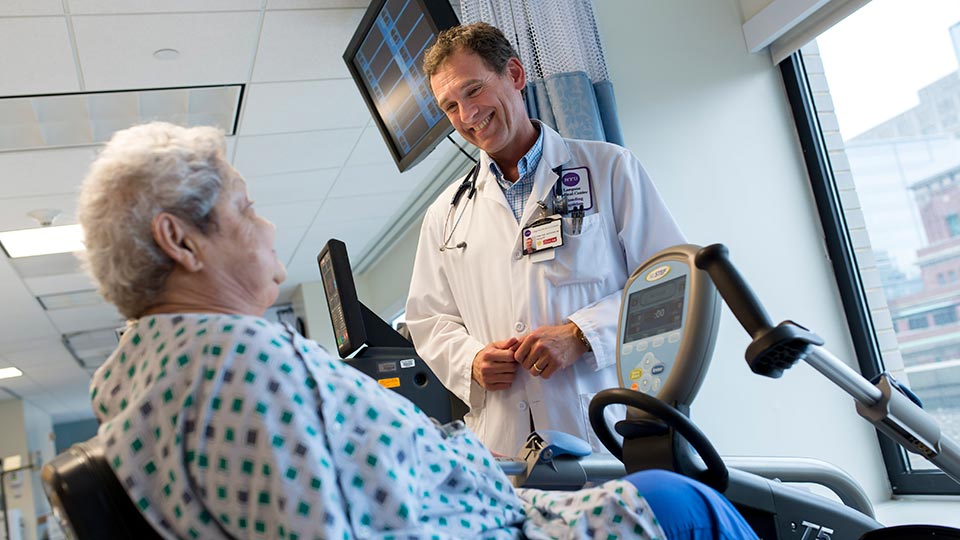Pulmonary Rehabilitation
Following lung surgery or hospitalization for a lung-related problem, you may benefit from pulmonary rehabilitation at NYU Langone’s Rusk Rehabilitation. Your need for this service depends on your medical condition and your physical ability.

Lung-related conditions we offer rehabilitation for include the following:
- chronic obstructive pulmonary disease, known as COPD, including chronic bronchitis and emphysema, asthma, bronchiectasis, and cystic fibrosis
- pneumonia
- recovery from lung surgery, including removal of part of a lung, called a segmentectomy or lobectomy, or complete removal of a lung, called a pneumonectomy
- restrictive lung disease including pulmonary fibrosis, pulmonary sarcoidosis, spine or chest wall deformity, scoliosis and kyphosis, and lung muscle weakness involving the diaphragm or chest wall muscle
Most patients go through the following treatment steps: Care starts at NYU Langone’s Tisch Hospital or Kimmel Pavilion, where you receive rehabilitation for your pulmonary event. Then, if needed, you go to Rusk Rehabilitation’s Pulmonary Rehabilitation Program for three or more hours per day, during a hospital stay of a week or longer. While there, you work with our occupational therapists, physical therapists, psychologists, speech–language pathologists, rehabilitation nurses, and social workers who specialize in pulmonary rehabilitation.
Other patients may move to a skilled nursing facility for subacute inpatient care, where they receive monitored exercise therapy for two to three hours a day over several weeks.
After discharge from the hospital or nursing facility, rehabilitation therapists from a community home healthcare agency provide 30- to 60-minute therapy sessions, 2 or 3 times a week in your home. When ready, you transition to outpatient pulmonary rehabilitation at Rusk Rehabilitation for two- to three-hour-long sessions per week.
After completing outpatient treatment, we give you the tools you need to adhere to a lifelong healthy lifestyle, including an exercise program you can do at home or your local gym.
Inpatient Pulmonary Rehabilitation Program
At Rusk Rehabilitation’s Pulmonary Rehabilitation Program, physiatrists—doctors who specialize in rehabilitation medicine—and cardiologists work with you to identify your rehabilitation needs and goals. Doctors in our program include Dr. Jonathan H. Whiteson and Dr. Sofiya Prilik.
During the initial phase of inpatient pulmonary rehabilitation at Tisch Hospital or Kimmel Pavilion, the goals are to:
- prevent the negative effects of bedrest
- use breathing and coughing techniques to teach you how to clear your lungs of unwanted secretions
- promote independence by focusing on your ability to get up, move around, and perform everyday activities such as bathing, dressing, and feeding yourself
- make the activities easier with an emphasis on energy conservation, pacing, and task simplification
- optimize the use of inhaled and nebulized pulmonary medications and oxygen if needed
- learn an at-home exercise program that can be followed after leaving the hospital
- assess the need for adaptive equipment and order such equipment as needed
Some patients are referred for admission to our acute Inpatient Pulmonary Rehabilitation Program. The goals of inpatient rehabilitation are to:
- maximize functional independence by focusing on strength, balance, walking, and activities of daily living
- improve your confidence and quality of life
- educate you on medication management and breathing strategies to reduce shortness of breath and promote clearance of pulmonary secretions
- help you start a lifestyle modification program based on your needs, which may include quitting smoking, losing weight, and taking steps to control diabetes, high cholesterol, and hypertension
- establish an appropriate discharge plan for community reintegration
- provide you with an individualized at-home exercise program
Pulmonary Rehabilitation Outpatient Program
Rusk Rehabilitation’s Pulmonary Rehabilitation Outpatient Program and the Pulmonary Rehabilitation Program at NYU Langone Hospital—Suffolk can help you overcome challenges such as breathlessness, fatigue, and weakness. We also help you reduce stress and anxiety, and teach you the proper way to take pulmonary medications, including oxygen.
This program includes the following facets:
- approximately 20 one-hour sessions of individualized aerobic exercise to promote strength, endurance, health, and wellbeing, and to teach you how to assess your tolerance for exercise by developing self-monitoring skills
- educational seminars on all aspects of pulmonary wellbeing with an emphasis on the proper use of peak flow meters, nebulizers, ventilators, and pulmonary devices including flutter valve, acapella®, lung flute, and Aerobika®, in conjunction with the chest physical therapy program
- nutritional guidance toward a healthy diet and optimal body weight
- individual or group classes on tobacco cessation
Upon completion, all participants are given individualized instructions to continue ongoing exercise programs and lifestyles that promote lung health. You are also encouraged to participate in a local pulmonary disease support group.